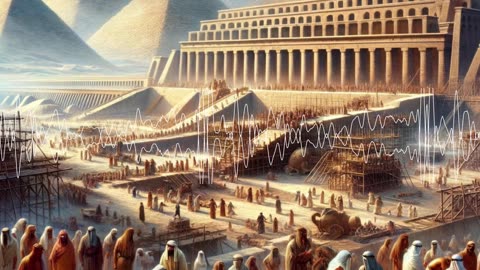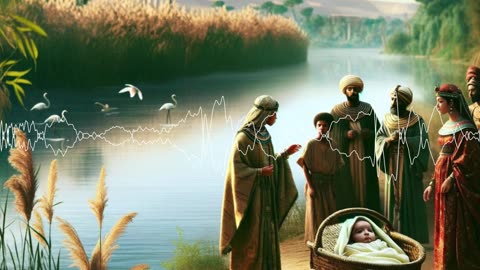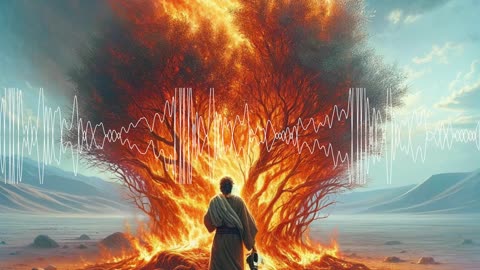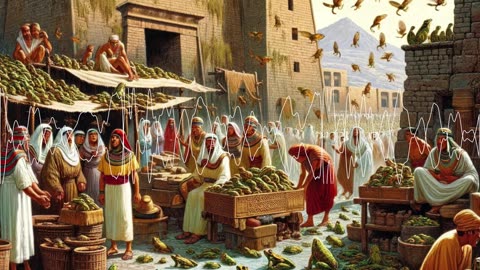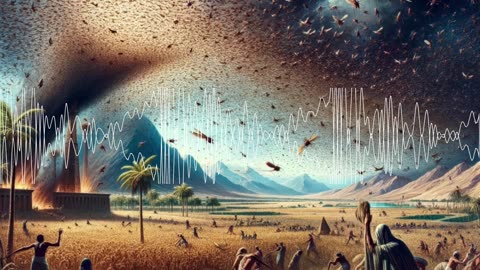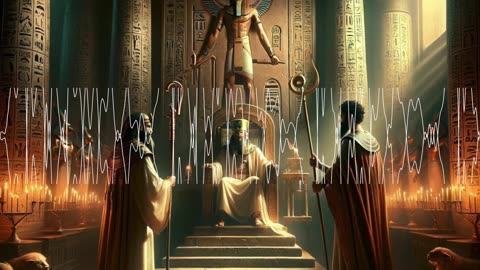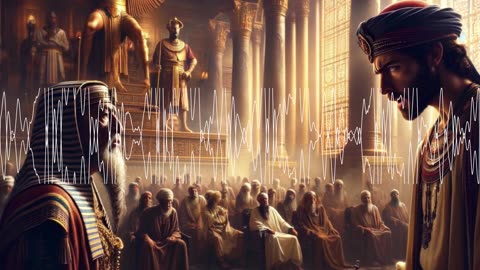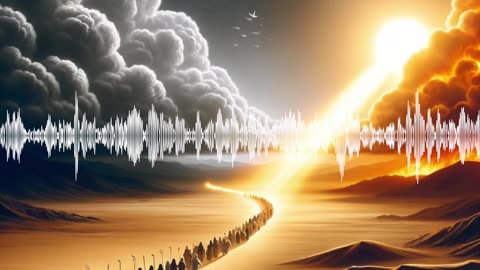Premium Only Content
This video is only available to Rumble Premium subscribers. Subscribe to
enjoy exclusive content and ad-free viewing.
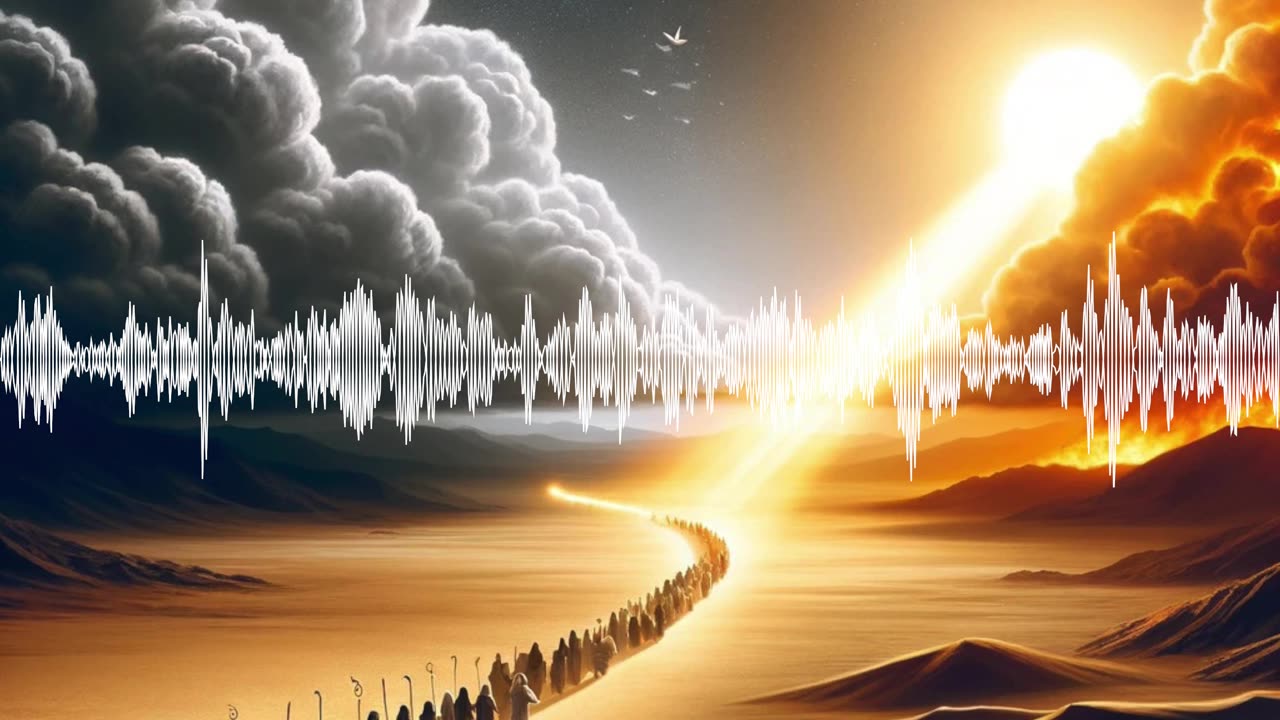
Exodus
sovereigndaud
- 12 / 12
1
"Miracle at the Sea: The Song of Deliverance"#Exodus15 #SongOfTheSea #Miracle #DivinePower
s
sovereigndaud
Dive into the powerful verses of Exodus 15, where Moses and the Israelites raise their voices in the "Song of the Sea," celebrating their miraculous escape from Pharaoh’s clutches. This chapter captures a pivotal moment in biblical history, showcasing a divine intervention that transforms the Israelites' fate from certain doom to exhilarating freedom. Through majestic lyrics, the song exalts Yahuah's might as He parts the Red Sea, allowing His people a passage to safety while their pursuers are engulfed by the waters. This song not only commemorates a historical miracle but also serves as an anthem of faith and divine protection, resonating with believers across generations. Join us as we explore the layers of praise and prophecy in this ancient hymn, understanding its impact and timeless relevance in the journey of faith.
Song of Deliverance
Verse 1:I sing to Yahuah, so exalted and high,The horse and its rider, into the sea, they fly.Yah, my strength and song, in You I am free,My deliverance and Al, forever You'll be.
Chorus:Yahuah, the warrior, mighty in fight,Your name alone scatters the terrors of night.Chariots and armies, You cast into the deep,As Your people watch, and their enemies weep.
Verse 2:Your right hand, O Yahuah, mighty to save,Crushed the enemy bold, the proud and the brave.With the breath of Your nostrils, the waters stood still,In the greatness of Your power, You perform Your will.
Chorus:Yahuah, the warrior, mighty in fight,Your name alone scatters the terrors of night.Chariots and armies, You cast into the deep,As Your people watch, and their enemies weep.
Bridge:Who is like You among the gods so divine?Awesome in praises, doing wonders, a sign.You lead Your redeemed, to Your holy abode,By the strength of Your arm, on the promise road.
Verse 3:Nations hear and tremble, dread grips the land,As Your people You guide with a gentle hand.To the mountain of Your inheritance, we rise,Where Your sanctuary stands, 'neath the open skies.
Chorus:Yahuah, the warrior, mighty in fight,Your name alone scatters the terrors of night.Chariots and armies, You cast into the deep,As Your people watch, and their enemies weep.
Outro:Yahuah reigns, forever and ever on high,From the depths of the sea to the breadth of the sky.Sing to Yahuah, for He is highly exalted,The horse and its rider, by the sea they were halted.
2
Exodus Chapter 1: The chapter recounts the multiplication of the Israelites
s
sovereigndaud
Exodus Chapter 1: making them a formidable force. However, a new Pharaoh, who did not know Joseph, felt threatened by their numbers and decided to oppress them with hard labor, building cities for Pharaoh. When this did not decrease their numbers, Pharaoh ordered the Hebrew midwives to kill all newborn Hebrew boys, but they feared Yahuah and did not comply. Pharaoh then commanded all his people to throw every Hebrew boy born into the Nile River.
Our efforts to honor the depth and authenticity of the scriptures, we restore the following terms to their original Hebrew, bringing us closer to the text's intended meaning. This restoration not only seeks linguistic accuracy but also reconnects us with the roots of our faith, tracing back to Eber—a direct descendant of Noah, alive during the Tower of Babel, and great-grandfather to Abraham, the father of the Hebrew people. By doing so, we acknowledge the rich historical and cultural heritage that has shaped the scriptures.
* Yahuah: We restore this divine name in place of "Lord" to distinguish it from Baal and to honor its scriptural prevalence. This emphasizes the importance of using the name as given in the text, reflecting our commitment to the authentic divine identity.
* Aduni: Restored instead of "God" to provide a direct transliteration, underscoring our adherence to the specific language of the scriptures and honoring the linguistic heritage passed down from Eber.
* Yahusha: The Hebrew name for "Jesus" and "Joshua" is restored, highlighting the meaning "Yahuah is salvation." This restoration deepens our connection to the Messiah's role as the fulfillment of divine promise, embodying the continuity of faith from Eber through Abraham to the present.
* Yisharal: "Israel" is restored to its original Hebrew pronunciation, reflecting the covenantal relationship between Yahuah and His people, a lineage that traces back to the time of Eber and beyond.
* Yahudah: Restored in place of "Judah," incorporating "Yah" as a direct form of praise and recognition of Yahuah's enduring presence, echoing the faith of our ancestors.
* Yom (day) and Lailah (night), Arets (earth), Shamayim (heaven), Hashamayim (the heavens), and Mayim (waters): These terms are restored to their scriptural Hebrew, anchoring our understanding in the creation narrative and the language that Eber and his descendants would have recognized.
This comprehensive approach is not merely about linguistic precision; it represents a journey back to the origins of our scriptural heritage, fostering a deeper connection with the divine narrative as it was originally conveyed. By embracing the names and terms as they were intended, we pay homage to the legacy of Eber, Abraham, and the Hebrew lineage, enriching our spiritual understanding and practice.
3
EXODUS Chapter 2: The spies enter Jericho and are hidden by Rahab
s
sovereigndaud
Feed My Sheep: Soul Food
Organic Ingredients:
* Living Water (John 4:14)
* Unleavened Word of Yahuah (Matthew 4:4)
* Green Pastures of Peace (Psalm 23:2)
* Oil of Joy (Psalm 45:7)
* Salt of the Earth (Matthew 5:13)
* Fruit of the Spirit (Galatians 5:22-23)
* Eternal Names: Yahuah & Alahim (Exodus 3:15)
• Contains no artificial sweeteners or religious leaven
Recommended Daily Dose:
Engage as needed for strength, peace, and spiritual growth. No upper limit—overflowing doses encouraged for maximum heart and soul health.
4
Moshe came upon the burning bush where Yahuah spoke to him
s
sovereigndaud
Exodus Chapter 3: While tending his father-in-law's flock in Midian, Moshe came upon the burning bush where Yahuah spoke to him. Yahuah called Moshe to lead the Israelites out of Egypt and revealed His name, Yahuah, to Moshe. Yahuah promised to be with him and gave him signs to prove to the Israelites and Pharaoh that Yahuah had sent him.
5
Exodus 7 Frogs Everywhere!!
s
sovereigndaud
* The transformation of Aaron's rod into a serpent could symbolize divine authority and power, echoing ancient symbols without a direct link to the Edenic serpent.
* Blood as the first plague highlights a profound disturbance of life's essence, marking the beginning of severe judgments against Egypt.
* Blood outside the body represents death or uncleanliness, emphasizing the plague's impact on the Nile, Egypt's life source.
* Frogs as the second plague might symbolize not just physical annoyance but a deeper contamination of Egyptian daily life, challenging Egyptian deities.
* Moses was appointed by Yahuah to confront Pharaoh and lead the Israelites out of slavery, symbolizing a chosen mediator due to his unique cultural and social position.
* Aaron was chosen to be Moses' spokesman, enhancing communication due to Moses' self-professed lack of eloquence.
* Moses serves as a precursor to Yahusha (Jesus), exemplifying a mediator, deliverer, and intercessor, foreshadowing Yahusha (Jesus)' spiritual liberation and intercessory role.
1
comment
6
Exodus Chapter 8: This chapter describes the second, third, and fourth plagues brought upon Egypt
s
sovereigndaud
The plagues of frogs, flies, and gnats, as sent by Yahuah upon Egypt, carry deep symbolic significance within the narrative of Exodus, each representing a divine challenge to the Egyptian pantheon and a demonstration of Yahuah's power over nature and the gods of Egypt. The plague of frogs (from the Nile) mocked the Egyptian god Heket, associated with fertility and depicted with a frog head, undermining the Egyptians' reverence for her powers. The swarms of flies disrupted daily life and emphasized Yahuah’s ability to penetrate the protected spaces of Egyptian homes, challenging the deity Khepri, who was represented as a scarab beetle and associated with the movement of the sun. The gnats, born from the dust of the earth, defied the god Geb, the deity of the earth, showcasing Yahuah's sovereignty over the very ground Egyptians walked on. Each plague was a lesson in humility, teaching Pharaoh and the Egyptians that Yahuah, not their deities, held dominion over creation, leading up to the ultimate deliverance of His people. These plagues, beyond their immediate discomfort and chaos, served a greater purpose in the divine plan, demonstrating Yahuah’s unmatched power and His will to liberate His people.
7
Exodus Chapter 9: Yahuah sends the fifth, sixth, and seventh plagues:
s
sovereigndaud
a pestilence that kills Egyptian livestock, boils that afflict Egyptians and their animals, and a devastating hailstorm that destroys crops and livestock. Despite the increasing severity of these plagues, Pharaoh's heart remains hardened
1
comment
8
Exodus Chapter 10: The eighth and ninth plagues
s
sovereigndaud
The eighth and ninth plagues are locusts, which devour all the crops and greenery left undamaged by the hail, and darkness, which covers Egypt for three days. These plagues further devastate Egypt's economy and daily life, yet Pharaoh's heart remains hardened. After each plague, Pharaoh momentarily agrees to let the Israelites go, only to change his mind and continue to detain them, leading to a continued demonstration of Yahuah's power and judgment against Egypt.#Yahusha #Yahusha #BibleVerses #BelieverLife #SpiritualGrowth #Prayer #Gospel #SpiritualLife #Faith #Trust #Christian #10Comandments #Torah #Moses
9
Exodus Chapter 12: This chapter introduces the Passover. PART 2
s
sovereigndaud
Yahuah gives instructions to the Israelites on how to prepare for the Passover meal and the significance of the lamb's blood, which is to be placed on the doorposts and lintels of their homes. This sign will protect the Israelites from the final plague. At midnight, Yahuah strikes down all the firstborn in Egypt, leading to a great mourning throughout the land. Pharaoh finally orders the Israelites to leave. The chapter also outlines the regulations for observing Passover in the future and marks the beginning of the Israelites' exodus from Egypt.
10
Exodus Chapter 11: Yahuah informs Moshe about the final plague
s
sovereigndaud
that will compel Pharaoh to release the Israelites: the death of every firstborn in Egypt, from the firstborn of Pharaoh to the firstborn of the slave girl and all firstborn of the livestock. Moshe warns Pharaoh of the impending disaster, but Pharaoh's heart remains hardened. Yahuah also instructs the Israelites to ask the Egyptians for silver and gold jewelry in preparation for their departure.
1
comment
11
Exodus Chapter 12: This chapter introduces the Passover. PART 1
s
sovereigndaud
Yahuah gives instructions to the Israelites on how to prepare for the Passover meal and the significance of the lamb's blood, which is to be placed on the doorposts and lintels of their homes. This sign will protect the Israelites from the final plague. At midnight, Yahuah strikes down all the firstborn in Egypt, leading to a great mourning throughout the land. Pharaoh finally orders the Israelites to leave. The chapter also outlines the regulations for observing Passover in the future and marks the beginning of the Israelites' exodus from Egypt.
1
comment
Exodus Chapter 13: Yahuah commands the Israelites to consecrate every firstborn male to Him,
s
sovereigndaud
both human and animal, as a remembrance of the final plague that led to their freedom. The chapter also details the observance of the Feast of Unleavened Bread, symbolizing the Israelites' haste in leaving Egypt. Moshe leads the Israelites out of Egypt, carrying Joseph’s bones with them, and they are guided by a pillar of cloud by day and a pillar of fire by night.
Exodus Chapter 13: Yahuah commands the Israelites to consecrate every firstborn male to Him,
10 months ago
14
both human and animal, as a remembrance of the final plague that led to their freedom. The chapter also details the observance of the Feast of Unleavened Bread, symbolizing the Israelites' haste in leaving Egypt. Moshe leads the Israelites out of Egypt, carrying Joseph’s bones with them, and they are guided by a pillar of cloud by day and a pillar of fire by night.
Loading comments...
-
 7:34:25
7:34:25
Dr Disrespect
19 hours ago🔴LIVE - DR DISRESPECT - WARZONE - IMPOSSIBLE TRIPLE THREAT CHALLENGE
207K30 -
 1:02:45
1:02:45
Tundra Tactical
9 hours ago $24.61 earned🛑 KASH PATEL NEW ATF DIRECTOR??? Breaking News!!!! 🛑
71.9K10 -
 4:31:10
4:31:10
I_Came_With_Fire_Podcast
19 hours agoMy EURO Divorce | HOGG with a side of PAC | Foreign FUNDS Fudged
42.3K2 -
 37:44
37:44
Glenn Greenwald
16 hours agoGlenn On Tearing Down the Military Industrial Complex, Exposing Pro-Israel Indoctrination, and More | SYSTEM UPDATE #411
119K129 -
 4:04:20
4:04:20
Nerdrotic
15 hours ago $52.86 earnedAmazon Takes 007! Hollywood is Lost, Disney Cancels WHO? | Friday Night Tights 342 /w ItsAGundam
180K46 -
 43:27
43:27
Tucker Carlson
14 hours agoRay Dalio: America’s Hidden Civil War, and the Race to Beat China in Tech, Economics, and Academia
174K191 -
 56:56
56:56
Candace Show Podcast
15 hours agoEXCLUSIVE: Taylor Swift Will Be Deposed. | Candace Ep 150
216K161 -
 1:03:52
1:03:52
IsaacButterfield
11 hours ago $8.19 earnedRepublican Vs 25 Transgender Activists | Jewish Outrage | Lizzo Loses All the Weight
70.3K14 -
 1:10:23
1:10:23
Edge of Wonder
15 hours agoChinese Biochips Hacking Minds? Quantum Control & Journey Song Mandela Effect
89.5K9 -
 2:15:46
2:15:46
Quite Frankly
18 hours ago"Ghosts, Robotics, and OBE's" ft. Dr. Albert Taylor 2/21/25
81.3K18

